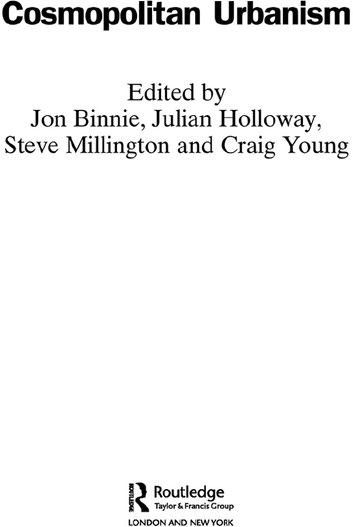| FindBook |
有 1 項符合
Cosmopolitan Urbanism的圖書 |
 |
Cosmopolitan Urbanism 作者:Binnie 出版社:Routledge 出版日期:2005-12-22 語言:英文 規格:精裝 / 259頁 / 23.6 x 16.3 x 1.8 cm / 普通級 |
| 圖書館借閱 |
| 國家圖書館 | 全國圖書書目資訊網 | 國立公共資訊圖書館 | 電子書服務平台 | MetaCat 跨館整合查詢 |
| 臺北市立圖書館 | 新北市立圖書館 | 基隆市公共圖書館 | 桃園市立圖書館 | 新竹縣公共圖書館 |
| 苗栗縣立圖書館 | 臺中市立圖書館 | 彰化縣公共圖書館 | 南投縣文化局 | 雲林縣公共圖書館 |
| 嘉義縣圖書館 | 臺南市立圖書館 | 高雄市立圖書館 | 屏東縣公共圖書館 | 宜蘭縣公共圖書館 |
| 花蓮縣文化局 | 臺東縣文化處 |
|
|
In order to attract investment and tourism, cities are increasingly competing to re-brand themselves as cosmopolitan, and in recent years, cosmopolitanism has become the focus of considerable critical attention in academia. Here, renowned editors and contributors have come together to produce one of the first books to tackle cosmopolitanism from a geographical perspective.
Central to the cosmopolitan process is how traditionally marginalized groups have become re-valued and reconstructed as a resource in the eyes of planners and politicians. This fascinating book examines the politics of these transformations by understanding the everyday practices of cosmopolitanism. Which forms of cultural difference are valued and which are excluded from this re-visioning of the contemporary city? Organized in three distinct parts, the book covers:
- production and consumption, and cosmopolitanism
- the spatialities of cosmopolitanism
- the deployment, mobilization and articulation of cosmopolitan discourses in policy-making and urban design.
The volume is groundbreaking in examining the complex politics of cosmopolitanism in empirical case studies from Montreal to Singapore, London to Texas, Auckland to Amsterdam. With a strong editorial steer, including general and section introductions and a conclusion to guide the student reader, Cosmopolitan Urbanism employs a range of theoretical and empirical approaches to provide a grounded treatment essential for students of human geography, urban studies and sociology.
|











